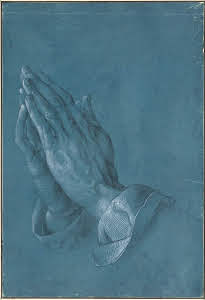
Have you ever had dry, cracked hands? Manual workers ofter have this problem. So do medical people who must use hand sanitiser frequently, to ensure they do not infect their patients.
As COVID strangles the globe, there are thousands of health workers who have dry, cracked hands; especially those who are struggling to save lives in refugee camps, mission hospitals and crowded slums.
This true story is dedicated to all of them. Back in the fifteenth century, in a tiny village near Nuremberg, lived a family with eighteen children. Eighteen! In order merely to keep food on the table for this crowd, their father, who was a goldsmith by profession, worked almost eighteen hours a day at his trade; plus taking any other paying chore he could find in the neighbourhood.
Despite their seemingly hopeless condition, two of the older Durer children, Albrecht and Albert, had a dream. They both wanted to pursue their talent for art, but they knew full well that their father would never be financially able to send either of them to Nuremberg to study at the Academy. After many long discussions at night in their crowded bed, the two boys finally worked out a pact. They would toss a coin. The loser would go down into the nearby mines and, with his earnings, support his brother while he attended the Art Academy. Then, four years later, when that brother who won the toss had completed his studies, he would support the other brother at the Academy; either with sales of his artwork or, if necessary, by labouring in the mines. They tossed a coin on a Sunday morning after church. Albrecht Durer won the toss and went off to Nuremberg.
Albert went down into the dangerous mines, and, for the next four years, he slogged and struggled, and thus financed his brother; whose work at the academy was an almost immediate sensation. Albrecht's etchings, his woodcuts, and his oils, were far better than those of most of his professors; and by the time he graduated, he was beginning to earn considerable fees for his commissioned works.
When the young artist competed his four years of studies, he returned to his village. The proud Durer family held a festive dinner on their lawn to celebrate Albrecht's triumphant homecoming. After a long and memorable meal, punctuated with music and laughter, Albrecht rose from his honoured position at the head of the table to drink a toast to his beloved brother for the years of sacrifice that had enabled Albrecht to fulfil his ambition. His closing words were, "And now, Albert, blessed brother of mine, it is your turn. Now you can go to Nuremberg to pursue your dream, and I will take care of you." All heads turned in eager expectation to the far end of the table where Albert sat, tears streaming down his pale face He shook his lowered head from side to side while he sobbed and repeated, over and over, ”No ... no ... no."
Finally, Albert rose and wiped the tears from his cheeks. He glanced down the long table at the faces he loved, and then, holding his hands close to his right cheek, he said softly, "No, brother. I cannot go to Nuremberg . It is too late for me. Look! See what four years in the mines have done to my hands! The bones in every finger have been smashed at least once, and lately I have been suffering from arthritis so badly in my right hand that I cannot even hold a glass to return your toast; much less make delicate lines on parchment or canvas with a pen or a brush. No, brother; for me it is too late."
More than 500 years have passed since the Durer brothers flipped that coin.. Now, hundreds of Albrecht’s masterful portraits, pen and silver-point sketches, watercolors, charcoals, woodcuts, and copper engravings hang in every great museum in the world. Yet most people are familiar with only one of Albrecht Durer's works. You may very well have a reproduction hanging in your home or office. One day, to pay homage to Albert for all that he had sacrificed, Albrecht Durer painstakingly drew his brother's damaged hands with palms together and thin fingers stretched towards Heaven. People recognised that this drawing was a masterpiece, and renamed his tribute of love "The Praying Hands."
This touching creation has become a symbol of hope around the world.. From the hands, broken in loving sacrifice for him, Albrecht has crafted a simple, poignant , picture. Those praying hands seek God’s comfort and help, and remind us to turn to God when life overwhelms us. HE is our hope, our anchor in the storm, and He will carry us through.
Shared by Rose Francis
 RSS Feed
RSS Feed